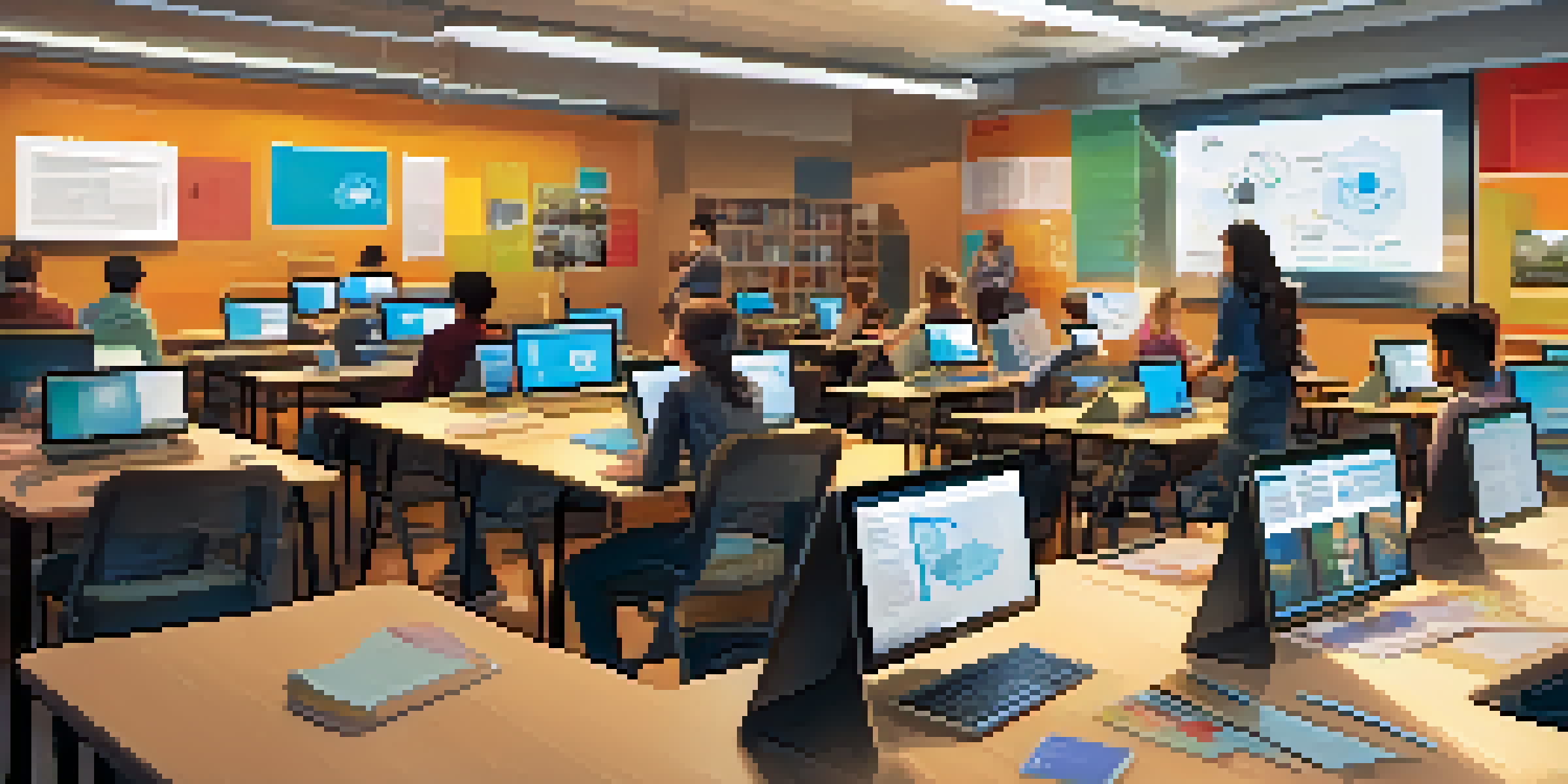The Role of Educators in Guiding Digital Research Projects

Understanding the Digital Research Landscape
In today's digital age, research projects often extend beyond traditional methods. Educators must help students navigate this evolving landscape, where information is abundant yet varies in credibility. Understanding the digital research landscape means recognizing the types of sources available, such as academic journals, blogs, and social media. By fostering this understanding, educators can empower students to discern valuable information from noise.
The internet is an extraordinary resource, but it also has its dangers. The proliferation of misinformation is one of the greatest challenges of our time.
Moreover, the sheer volume of data available can be overwhelming for students. Educators play a pivotal role in teaching them how to filter and choose the right materials for their projects. This guidance not only enhances their research skills but also prepares them for future endeavors in an information-rich world.
Ultimately, a solid understanding of the digital research landscape lays the groundwork for successful projects. When students feel equipped to tackle their research, they are more confident and engaged in the learning process.
Teaching Critical Evaluation of Sources
One of the most crucial skills educators can impart is the ability to critically evaluate sources. In a world filled with misinformation, students must learn to ask questions about the reliability and validity of their sources. Educators guide them through this process by introducing criteria such as authority, accuracy, and bias, making it easier for students to assess the quality of information.

For example, an educator might present a range of articles on a given topic, prompting students to analyze the credentials of the authors and the publication's reputation. This exercise not only boosts their analytical skills but also encourages healthy skepticism, which is vital in academic research.
Navigating Digital Research Sources
Educators empower students to discern credible information from various digital sources, enhancing their research skills.
By teaching students to critically evaluate sources, educators help them develop lifelong research skills. These skills extend beyond the classroom, enabling students to make informed decisions in their personal and professional lives.
Facilitating Collaboration in Research Projects
Collaboration is key in modern digital research, and educators are instrumental in facilitating this process. They encourage students to work together, sharing ideas and resources while fostering a sense of community. This collaborative spirit not only enhances the research experience but also mirrors real-world scenarios where teamwork is essential.
Research is creating new knowledge.
Educators can employ various tools and platforms that promote collaboration, such as shared documents and communication apps. By guiding students in utilizing these resources, educators help them navigate the dynamics of group work, emphasizing the importance of communication and respect for differing viewpoints.
Through collaboration, students learn to value diverse perspectives, which enriches their research projects. Educators, therefore, play a crucial role in helping students connect with one another and create a supportive research environment.
Integrating Technology into Research Methodologies
Incorporating technology into research methodologies is another vital role for educators. As digital tools become integral to research, educators help students learn how to use these technologies effectively. This includes teaching them about data collection methods, digital analysis tools, and presentation software, all of which enhance the research process.
For instance, an educator might introduce a statistical software that allows students to analyze their data in real-time, making the research experience more interactive and informative. By familiarizing students with these technologies, educators equip them with essential skills for future academic and professional pursuits.
Promoting Ethical Research Practices
Teaching academic integrity and ethical considerations prepares students to responsibly handle information in their research.
Ultimately, integrating technology into research empowers students to innovate and think critically. Educators who embrace this approach provide their students with a competitive edge in the increasingly tech-driven world.
Encouraging Ethical Research Practices
Ethical considerations are paramount in any research project, and educators play a key role in instilling these values in students. They teach the importance of academic integrity and the proper way to cite sources, ensuring that students understand the repercussions of plagiarism. This foundational knowledge cultivates a sense of responsibility and respect for others' work.
Educators can also discuss issues such as privacy and consent, especially when involving human subjects in research. By addressing these topics openly, they prepare students to navigate the ethical complexities they may encounter in their research journeys.
By encouraging ethical research practices, educators foster a culture of honesty and respect in academic settings. This commitment to integrity not only benefits students academically but also shapes their character as responsible individuals.
Supporting Diverse Learning Needs in Research
Every student has unique learning needs, and educators must adapt their guidance accordingly during digital research projects. By recognizing these individual differences, educators can tailor their support to ensure that all students have equal opportunities to succeed. This might involve offering differentiated instruction or personalized feedback on their research approaches.
For example, a student struggling with reading comprehension may benefit from visual aids or simplified resources. By providing such support, educators can help bridge gaps in understanding and empower students to engage with their research topics more deeply.
Fostering Lifelong Learning and Curiosity
By inspiring curiosity and a love for exploration, educators equip students with essential research skills for their future.
Ultimately, supporting diverse learning needs enhances the overall research experience for all students. When educators prioritize inclusivity, they create an environment where every student feels valued and capable of contributing to their projects.
Fostering Lifelong Research Skills and Curiosity
One of the most rewarding aspects of an educator's role in guiding digital research projects is fostering a love for learning. Educators inspire curiosity and a desire for knowledge, encouraging students to explore topics beyond the confines of their assignments. This intrinsic motivation is crucial for developing lifelong research skills.
By creating a stimulating environment where questions are welcomed, educators help students view research as a journey rather than a task. This shift in perspective can lead to greater engagement and a more profound understanding of the subject matter.

In the end, educators who nurture curiosity and a passion for research equip students with tools that extend beyond the classroom. These skills are invaluable as students navigate their future academic and career paths.